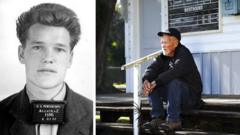
The Rock: A Glimpse into Charlie Hopkins' Alcatraz Years
A Chronicle of Confinement: 1950s Alcatraz
Alcatraz Island, a name synonymous with impenetrable security and infamous criminals, looms large in the annals of American penal history. During the 1950s, the island fortress served as the ultimate destination for those deemed too dangerous or incorrigible for other federal prisons. Within its cold, damp walls, men lived out their sentences, often in profound isolation. Among those who experienced this harsh reality was Charlie Hopkins, whose three-year incarceration offers a stark look into life on "The Rock."
Arrival and Initial Impressions
Hopkins arrived at Alcatraz during an era when the prison was at its peak in terms of security and reputation. The process of being admitted was designed to strip away any semblance of individuality and assert control. From the moment the ferry docked, inmates were subjected to rigorous searches, assigned numbers, and forced to adhere to a strict regime of rules and regulations. The initial impact was often one of shock and disbelief, as the weight of confinement began to sink in.
Daily Life Behind the Walls
Life in Alcatraz was characterized by monotony and deprivation. Days were structured around a rigid schedule of meals, work assignments, and brief periods of recreation. Inmates spent a significant portion of their time in their cells, small and sparsely furnished spaces that offered little comfort or privacy. The sound of clanging cell doors, the constant surveillance of guards, and the echoes of other inmates created an atmosphere of tension and despair.
- Meals: Food was basic and utilitarian, served in a mess hall where inmates were closely monitored.
- Work: Labor assignments, such as laundry or maintenance tasks, provided a means of occupying time but offered little in the way of rehabilitation.
- Recreation: Limited recreational opportunities, such as access to a small yard or library, were tightly controlled and subject to restrictions.
The Isolation Factor
Perhaps the most challenging aspect of imprisonment in Alcatraz was the profound sense of isolation. The prison was designed to minimize contact between inmates, fostering an environment of alienation and psychological distress. Communication was restricted, and opportunities for meaningful interaction were rare. This enforced solitude took a heavy toll on the mental and emotional well-being of those incarcerated within its walls.
Enduring the Years
Hopkins' three years in Alcatraz were undoubtedly a test of his resilience and mental fortitude. The daily grind of confinement, the lack of human connection, and the constant awareness of being cut off from the outside world presented formidable challenges. While the specifics of his experience remain somewhat obscured by the passage of time, it is clear that his time on "The Rock" left an indelible mark.
The psychological impact of such extended isolation cannot be overstated. Many inmates struggled with depression, anxiety, and feelings of hopelessness. The absence of supportive relationships and the constant pressure of surveillance contributed to a sense of despair that permeated every aspect of their lives.
Alcatraz: A Symbol of Punishment
Alcatraz remains a potent symbol of punishment and the limits of human endurance. The story of Charlie Hopkins, though just one among many, serves as a reminder of the harsh realities faced by those who were confined within its walls. His three "lonely" years encapsulate the essence of what it meant to be an inmate on "The Rock" during its most infamous era.
The Legacy of Alcatraz
Alcatraz ceased operations as a federal prison in 1963, deemed too expensive to maintain and plagued by structural problems. However, its legacy continues to fascinate and intrigue. Today, the island is a popular tourist destination, attracting visitors from around the world who come to explore its history and contemplate the lives of those who were once held captive within its walls. The stories of inmates like Charlie Hopkins serve as a poignant reminder of the human cost of crime and punishment, and the enduring power of the human spirit to endure even the most trying of circumstances.
```